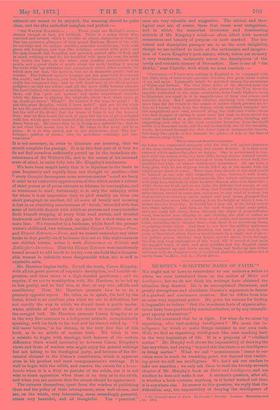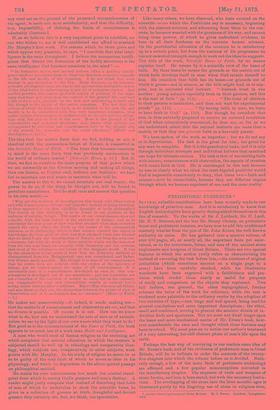MURPHY'S "SCIENTIFIC BASES OF FAITH."
WE ought not to have to reintroduce to our readers a writer to whom we once introduced them as the author of Habit and" Intelligence, but we do not think his writings have obtained the attention they deserve. He is an accomplished Darwinist, and greatly strengthens and elucidates-Darwin's arguments in favour of a gradual and continuous creation. But he differs from him on some very important points. He gives his reasons for finding it impossible to believe "that the wondrous feats of organic adap- tation have been produced by natural selection, or by any unintelli- gent agency whatsoever."
We feel convinced that he is right. For what do we moan by organising, alias tool-making intelligence ? We mean the in- telligence by which we make things minister to our own ends. Well, we find an organising intelligence like ours reaching back to the very beginnings of life. It is a property of "vitalised matter." Mr. Murphy well shows the impossibility of drawing the line anywhere, and saying "beyond this line there is no intelligence in living matter." What we call " consciousness " seems to our vision soon to reach its vanishing-point, but beyond that vanish- ing-point we still see intelligence. We don't ask our readers to take our assertion ; we only ask them to read the twenty-seventh chapter of Mr. Murphy's book on Habit and Intelligence, and see whether he does not make it out. A student's question, after all, is whether a book contains anything in it better worked out than it is anywhere else. In answer to this question, we reply that the difficulties, nay, the impossibility of denying the intelligence of * The Scientlfec Bases of Faith. By Joseph J. Murphy. London Macmillan and. Co. 1873.
any vital act on the ground of the presumed unconsciousness of the agent, is made out most satisfactorily, and that the difficulty, stay, impossibility, of defining the limits of consciousness is admirably illustrated.
If, as we believe, this is a very important point to establish, no one who wishes to see it well established can afford to overlook Mr. Murphy's first work. For reasons which he there gives and which appear very plausible, be says, "I conclude that vital intel- ligence is the same throughout. I believe the unconscious intelli- .gence that directs the formation of the bodily structures is the same intelligence that becomes conscious in the mind"
In formative, motor, and mental actions alike, a guiding intelli- gence tends to determine them in whatever direction is most favourable to the life and health of the organism. I do not think that even disease is any exception to the law. Many diseases, as, for instance, probably all eruptive ones, are due to the unconscious instinctive action of the vital forces in endeavouring to get rid of poisonous matter. And morbid growths, like cancer, probably consist of portions of the orga- mism that have got away from the control of the general life, and lead a life of their own, parasitic on the rest, and ministering to their own life, though to the injury of the entire organism. The law that the actions of every organism are such as to minister to its own life and health is to be understdod with this very important extension, that under certain circumstances it ministers not to its own private advan- tage only, but also to that of the race. Here is the ground of the reproductive and maternal functions; and, where vital actions are accompanied by sensation and consciousness, here is the ground also of the sexual, the domestic, and the social affections." (Habit and Intelligence, c. xxvii.)
The idea that the motive force that we feel, bidding us act, is identical with the unconscious forces of Nature, is reasserted in
the Scientific Bases of Faith. "The force that becomes conscious in mind is the same force that was previously unconscious in the world of ordinary matter." (Scientific Bases, p. 46.) But if,
then, we feel in ourselves the inner purpose of that power which we see outwardly as the Creator moving and making all things, then our desires, as Fourier said, indicate our destinies ; we have but to ascertain our real wants to ascertain what will be.
The answer to this is, we cannot ascertain our real wants ; the power to do so, if the thing be thought out, will be found to postulate omniscience. But he shall raise and answer this question
in his own words :- "Why are the methods of investigation that begin with Observation and with Consciousness diverse and opposite, instead of being identical, as they appeared to the first childlike thoughts of early philosophy? The reason of this diversity is to be found in our position in the universe of existing things. The centre of our consciousness does not coincide with the true centre of the universe of things: and as in astronomy the true point of view was first attained when man ceased to regard the earth where he dwelt as the centre of the astronomical universe, so in philosophy, which is that science whereof the object is knowledge, the true point of view was first attained when man learned that he must bagin the investigation of Nature, not from his own con- sciousness, but with the study of those subjects which are the remotest from his own consciousness—namrdy, with Geometry and the sciences that treat of the substances and forces of the inorganic world. It was by the attainment of this point of view that the Inductive method, as distinguished from the Metaphysical one, was constituted, and Induc- tive Science made possible. But though it is true of our consciousness that its centre does not coincide with the centre of the universe of things, yet we cannot assert the same of all consciousness. It is necessarily true of a consciousness developed as ours is. Our con- sciousness is developed out of our sensations ; and our sensations are not a function of the universe of matter as such, but on the contrary, are comparatively rare and intermittent results of natural forces acting under very peculiar conditions. But to Him who sees all things, and sees them as they are, the distinction between the points of view of Observation and of Consciousness has no existence." (Bases of Faith, He makes out unanswerably—if, indeed, it needs making out—
that the methods of consciousness and observation are one, and that no divorce is possible. Of course it is not. How can we know what to do, how can we understand the acts of men or of animals, unless we see by the light of our own wants what they want to do ? But good as is the commencement of the Bases of Faith, the book appears to us much less of a work than Habit and Intelligence.
A man who would treat of human religion as the crowning act which completes that natural education to which the creature is subjected should be well up in ethnology and comparative theo- logy, which subjects are, comparatively to other subjects, weak points with Mr. Murphy. In his study of religion he seems to us to be guilty of the very fault of which he steers so clear in his physiology, and which he deprecates in the above-quoted passage on philosophical method.
He makes his own consciousness too much the central stand- point from which to survey God's purpose and man's destiny. A reader might justly complain that instead of describing that faith of man of which he undertakes to show the scientific bases, be gives us a collection of guesses at truth, thoughtful and devout guesses they certainly are, but, we think, too speculative. Like many others, we have observed, who have entered on the scientific cursus which the Positivists say is necessary, beginning with the abstract sciences, and advancing from them to the con- crete, he becomes wearied with the greatness of his way, and cannot bring those powers, of which he gives undoubted evidence, to bear in all their freshness on the concrete human sciences. On the providential education of the creature he is satisfactory. up to a certain point, but from the vastness of his programme he has not unwasted strength enough to work out the ideas he suggests. The title of the work, Scientific Bases of Faith, by no means explains itself. He means by it a scientific view of the bases of faith. By these bases he means the grounds or the matrix out of which faith develops itself in man when God reveals himself to him. He considers that faith has its bases—or grounds out of which it grows—not in science, as the title might lead us to sup- pose, but in universal vital instinct. "Animals trust in one another : young animals especially trust in their parents, and this is the root of faith" (p. 113) "The trust of children in their parents is instinctive, and does not wait for experimental proofs" (p. 113) "By having faith in man, we learn to have faith in God" (p. 119). But though he considers that man is thus naturally prepared to receive an outward revelation of God when miraculously announced, he does not, as far as we can understand, admit that the natural instincts are more than a matrix, or that they can generate faith in a heavenly parent.
We have spoken of the work as imperfect ; but we do no't say so in depreciation. His task is too great for him ; too great for any man to complete. But it is the grandest of tasks, and it is only through individual attempts and individual failures that mankind can hope for ultimate success. The task is that of reconciling faith with science, consciousness with observation, the aspects of creation with man's faith in God. He is encouraged in this task because he sees so clearly what we think the most bigoted positivist would find it impossible consistently to deny, that these two—faith and science—must be reconcilable, because they are different organs through which we become cognisant of one and the same reality.



































 Previous page
Previous page